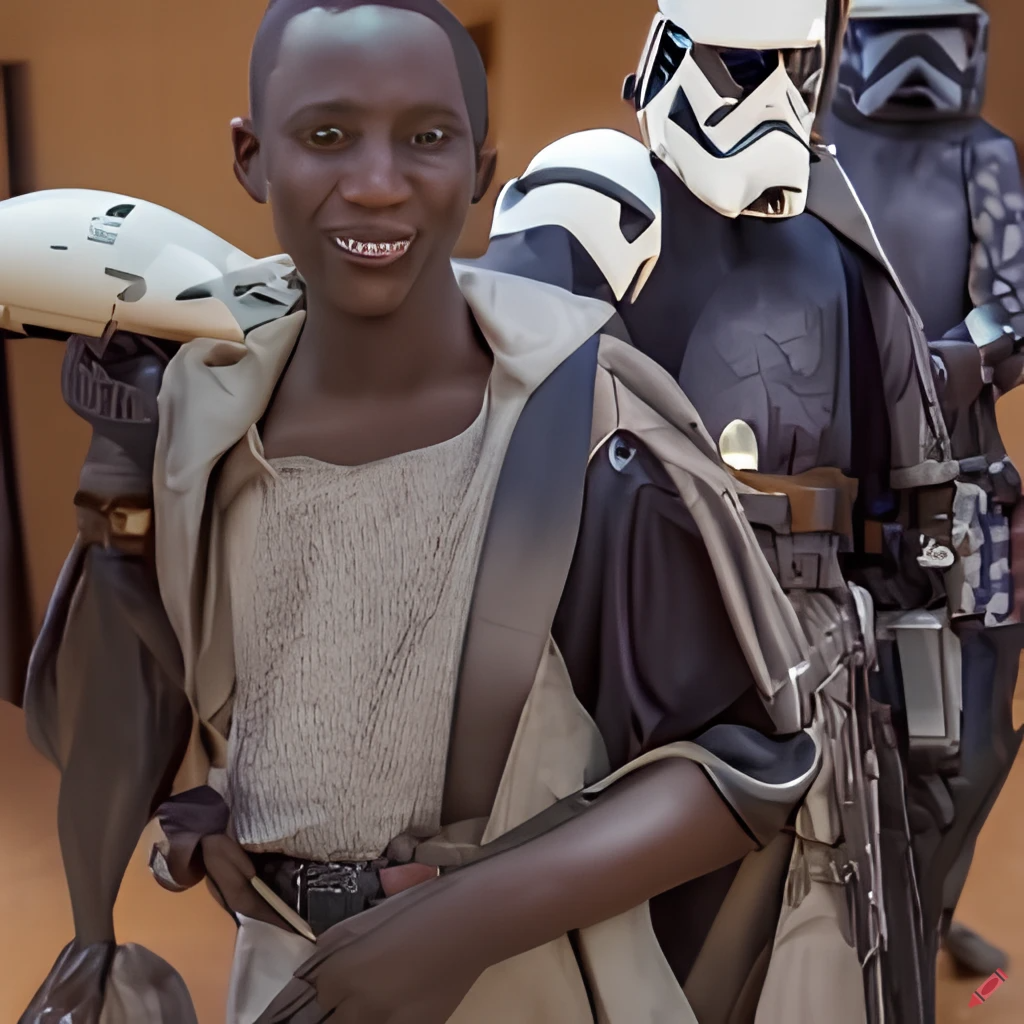The hot Nigerian sun beat down on the bustling marketplace as vendors haggled with customers over prices. Amidst the crowd, a small group of filmmakers were discussing their latest project – an ambitious low-budget remake of the Star Wars trilogy, set in an Afro-futuristic universe with Africanized names for the main characters.
“Okay, for the first film, we’ll call it ‘Nyoka Wars: The Spark of Freedom’,” said the director, a tall, lanky man with a thick Yoruba accent.
“Great name, boss!” replied one of the producers, a rotund Igbo man.
“Who’s gonna play Lucuana Ostu?” asked the makeup artist, a young Hausa woman.
“We’ll hold auditions next week,” said the director. “But for now, let’s focus on the droids. RU4R and CEPIO are our comedic duo, so we need actors with good comic timing.”
Meanwhile, in a small village on the outskirts of Lagos, a group of aspiring filmmakers were discussing their own sci-fi epic, set in a dystopian future where robots had taken over the world.
“We’ll call it ‘Ife Robot’,” said the director, a quiet, serious man with a shaved head. “It’s about a young girl who teams up with a group of rebels to overthrow the robot overlords and restore humanity to its rightful place.”
“That sounds amazing!” said the producer, a jovial man with a thick Igbo accent. “But how are we gonna film all the special effects on our budget?”
“We’ll have to get creative,” said the director. “Maybe we can use miniatures and practical effects instead of CGI. And for the robots, we can dress up actors in costumes and use clever camera angles to make them look bigger.”
As the two film crews worked on their respective projects, they faced many challenges and setbacks. The Nigerian heat was unforgiving, and equipment often broke down due to the harsh conditions. But through it all, they persevered, driven by their passion for storytelling and their desire to put African sci-fi on the map.
Finally, after months of hard work and dedication, both films were completed. “Nyoka Wars: The Spark of Freedom” had become a hilarious, irreverent romp through a galaxy far, far away, filled with slapstick droid antics and over-the-top action scenes. “Ife Robot”, on the other hand, was a gritty, dystopian thriller that explored themes of oppression and resistance, with stunning practical effects and an unforgettable performance by its young lead actress.
As the films premiered to packed theaters across Nigeria, audiences were amazed by what they saw. Never before had African sci-fi been so boldly and imaginatively represented on the big screen. And though the films were very different in tone and style, they both spoke to the resilience, creativity, and innovation of African filmmakers, and the limitless potential of African sci-fi as a genre.
Nigerian sci-fi cinema, often referred to as “Nollywood Sci-Fi,” is a growing genre of African cinema that merges elements of traditional African storytelling with science fiction and fantasy themes. While Nollywood is primarily known for its low-budget, straight-to-DVD productions, the sci-fi genre is pushing boundaries and challenging expectations.
One of the pioneers of Nigerian sci-fi cinema is filmmaker Kunle Afolayan, who directed the 2009 film “The Figurine.” The movie tells the story of two friends who find a mystical statue and are faced with a series of supernatural events. The Figurine was widely acclaimed, and it opened up new opportunities for Nigerian sci-fi filmmakers.
Since then, Nollywood has produced a variety of sci-fi films, ranging from post-apocalyptic tales to futuristic dramas. Many of these films focus on social and political issues in Nigeria and the wider African continent. For example, “Elysium,” a 2019 Nigerian sci-fi film, depicts a dystopian world where the wealthy live in a floating city, while the poor are left to struggle on a desolate earth.
Another notable Nigerian sci-fi film is “Hello, Rain,” which premiered in 2018. The film tells the story of a woman with mystical powers who controls the weather, but is faced with societal pressure to conform to expectations. The film is visually stunning and uses special effects to create a world that is both familiar and otherworldly.
One of the challenges facing Nollywood sci-fi is the lack of resources, which limits the quality of special effects and sets. However, this has not stopped filmmakers from pushing boundaries and using their creativity to produce compelling stories.
In summary, Nigerian sci-fi cinema is a rapidly growing genre that is pushing boundaries and challenging expectations. While it may not yet have the resources of Hollywood, it is producing innovative and thought-provoking stories that draw on African culture and address social and political issues.


